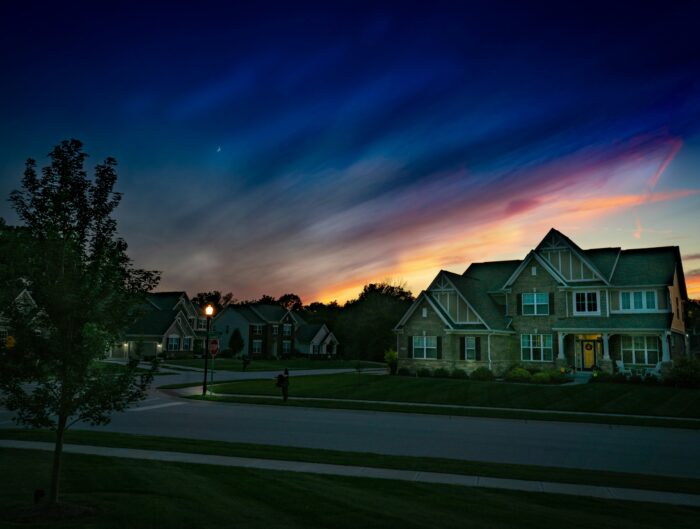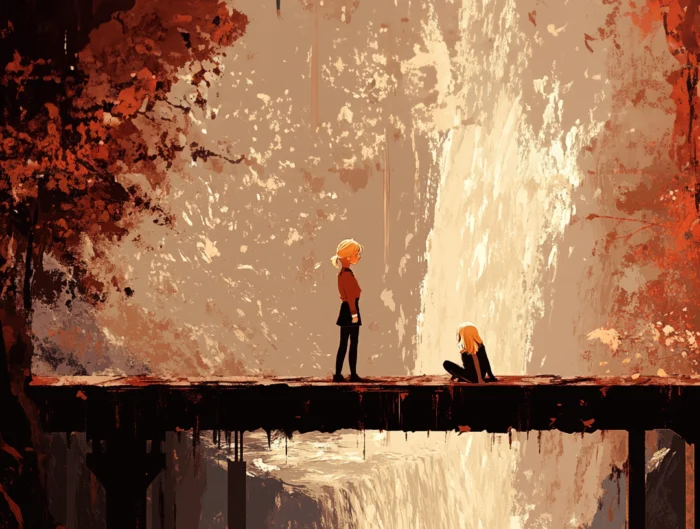Whenever that question, “where’re ya from,” invariably arose among the transients and tourists alike thrust together in the service industries of vacation towns, Amelia named the nearest beach growing up and, if pressed, focused on its endless shores and bioluminescent waves that at night glowed like simmering aquamarine flames. Many assumed, the way she spoke of it, that she hailed from some exclusive beach-front borough, but for every wealthy enclave along the coast, there was a larger community from which it leached not far behind. She let the assumption lie for her. Though, having found expectation more powerful than deception.
The Keys were like a house party, its owners gone for the weekend. Everyone was welcome so long as no one was around to claim otherwise. When colonists first arrived, the islands were inhabited by a native tribe that came to be known as the Calusa people. As their population dwindled from conflict and disease and the lands passed between empires, the last remaining of them were deported to Cuba. Amelia learned all this in the first days, loitering at the edge of tour groups, fascinated by how tragedy could be painted over with gift shops and bottomless mimosas.
She was making good money bartending—half the economy amounted to serving food or drink, if not adventure tours and parasail rides—but she didn’t hold onto it long, buying herself Christian Louboutin flats, Saint Laurent bags, Dolce & Gabbana frames. Her only expense was an efficiency apartment in the heart of town, a single room with a bed, mini-fridge, and pastel flowers stenciled onto the walls, faded after having bloomed so long ago.
All told, it was a paradise. Crystal blue skies and lush green palms, save one factor she hadn’t anticipated: roosters littered the streets and crowed at nearly all hours of the day to mark their territory, particularly at dawn when Amelia was getting home and drawing the shades. Her first day, it was a joy seeing them clucking around with their halting stride. Brought over from the old world, they were raised on the island only to one day be set loose in favor of packaged supermarket cutlets. Now, to drown out the squawking males, she kept the A/C on full blast and cranked the white noise machine. Even then, she reached for a pair of neon pink foam earplugs and pulled a pillow over her head.
At five of eight, she slipped past the hostess stand and back into the kitchen where she picked at what was left of shift meal. She was already in uniform, black slacks, and a black button-up, her sleeves rolled halfway up her forearms, hair pulled back. The restaurant was in full swing as she walked onto the floor, raised the bar’s waist-high gate, and greeted Lena, the opening bartender.
“Some real cocks out there today,” Lena said and looked over to a group of sunburnt men in bright polos arguing amongst themselves.
“They kept me up all morning,” Amelia said, cutting limes.
Lena raised an eyebrow.
“Actual roosters,” she said. “I’m still kind of out of it.”
The whir of the thermal printer spitting out a ticket interrupted them, followed by another. It would go nonstop like this for hours. Amelia liked when it was busy—she didn’t have to talk to anyone beyond their order as she juggled between the patrons at the bar and drinks for the floor, could let go of everything else beyond the white rum she poured over lime juice and mint leaves.
She’d noticed the man sitting there alone. He wore a suit jacket with no tie and ordered Old Fashions with Knob Creek as he scanned the room for company. There was little else for him, no game on, the news only concerned with a tropical storm headed for Louisiana. It wasn’t until the bar was dying down that he said anything besides, “I’ll take another.” He asked for her name, and when she told him, he inquired if she was going to fly off into the sunset and disappear.
“One can only hope,” she said.
He introduced himself as Marcus, though he looked more like a Mark. He was drab and inoffensive, used to getting what he wanted without much effort, but handsome with broad shoulders and perfect white teeth he revealed when he smiled at her and asked, “What are you doing tomorrow?”
“Jury duty,” she said as she loaded pint and rocks glasses into the washer, not wanting to give him the satisfaction of her interest. In truth, she was starting to get tired of going back to her apartment alone. The bustling island with its frantic need for a good time imparted the illusion of a social life, but when she closed the door behind, she felt the weight of that isolation.
“That’s too bad,” he said and paused. “I have some business to attend to for a client,” he mumbled, “private island not far from here.”
“Is the guy Pablo Escobar or something?”
“Pretty sure he’s very dead, but no—I’m a realtor.”
“Less exciting,” she said.
“Maybe if your guy tomorrow takes a plea, you could join me.”
They took his boat across the teal gulf to the exclusive island property. As they approached, Amelia couldn’t help but feel a touch underwhelmed by the patch of sand surrounded by a rocky sea wall, a modest one-story taking up more than a third of it. When they docked, he jogged up to the place and made quick work with the lockbox, opening the door as though he’d always had a key. “Totally self-sufficient—solar panels, backup generator, desalination system, you name it.”
“What’s the neighborhood like?” she asked
“Uh.” He looked around at the open water.
“Joking.” She smirked. “It sounded like you were giving me the hard sell.”
His eyes lit up at the recognition of a pun and out poured a clumsy line about giving her the hard sell if she wanted it.
Amelia restrained herself from rolling her eyes. At least it would make for a good story, she thought. The place was dated but still had its charms. She was snapping photos with Marcus conveniently out of frame, adding captions like “#BLESSED.” At every turn, he was trying to put his arm around her. When his phone rang, he finally stepped aside. “Hey, mommy,” he said into the receiver, and she recoiled.
When he got off, he told Amelia that he needed to run into town and asked if she wanted to come with or stay here. She pretended to weigh her options before she said, “I’ll wait for you.”
She waved and when he pulled away, slammed shut the door and pulled from her bag a Naples Chardonnay. There was no corkscrew in the kitchen, but she found a pen and was able to impale the cork and pry it out. She took it to the bathroom and drew the water for the clubfoot tub, adding body wash for bubbles. Once the bottle was empty and the water tepid, she took to the bed, spending it like most nights scrolling Instagram and tallying likes. She’d hardly noticed that Marcus hadn’t returned.
She woke up to the shutters banging violently. The sky had torn open and come crashing down to Earth. With the storm raging outside, she ran to the now empty tub and climbed in, hugging her knees, waiting for one end or another.
The sound of a rooster crowing stirred her the second time. Her first thought was that she was back in her bed, but then she opened her eyes to a marbled ceiling and recessed light fixtures. It was dark. The light switch clicked fruitlessly. She peered out the front door—the skies still brooding and overcast. The beach was littered with palm tree branches, lapped at by an angry tide. That’s when she first saw him. A rooster, strutting across the sand, just going from one end of the beach to the other. She stood and watched until the bird suddenly stopped, turned toward her, and started again to crow, claiming this windswept land as its own. She slammed the front door and locked it.
“Okay,” she said to herself. “You’re okay.” She took a deep breath, tried to take stock of the situation. Her first instinct was her phone, but she found it dead. Marcus will be back, she thought. It was just a matter of time. But then why hadn’t he returned last night? Maybe something went wrong. Maybe he was hurt. But no, that wasn’t it, the plain truth suddenly occurring to her. He abandoned her here; didn’t want anyone to know he’d left her on an island with a storm barreling towards it. The only other person who might notice her gone was her manager, and he was bound to write her off as leaving just as swiftly as she came. Nobody would miss her; nobody was coming for her.
She kept trying to focus on her breathing to calm down before returning to the dilemma at hand and letting her neurons run wild again. For the next few hours, she scoured through every inch of the house, taking stock of what she might be able to use, which wasn’t much. There wasn’t a scrap of food in any pantries, no satellite phone, or even flares. “Self-sufficient, my ass,” she said. Soon she didn’t have enough energy to do anything more than lie down and try to ignore her body’s cry for sustenance, the pangs of her stomach digesting its own lining. Memories she’d long avoided swam to the surface. She was pleading with her parents, banging on the door they locked themselves behind, until finally they appeared wide-eyed and manic, loaded her up into the car, and drove into the country. When they came across a cornfield, her dad pulled to the side of the dirt road. Amelia ran into the dense stalks and bit into the first ear she could find. Sweet, milky juice ran down her face as she tore into the kernels. She pulled out of this flashback, shaking and dizzy, by the rooster cawing.
In a daze, she grabbed a throw blanket and rushed at the bird. As soon as it landed over him, he started pecking and scratching with primal fury. She leaped on top and tried to meet the blanket’s ends around him, but his talons were quickly tearing it to shreds, so instead, she stomped down with her heel, trying to locate the neck. She kept missing, hitting the ground or the fleshy parts of his body. Finally, she made contact with something hard and round that cracked under her weight, and like that, the flailing stopped.
From the kitchen, she found two large pots and filled them with water from the pump. She dragged both to the shore where she made a fire out of a white oak lounge chair. Once it was burned down to a bed of coals, she placed a pot over it. Bubbling, she tossed in the bird and started counting. At one-hundred-eighty, she fished it out with tongs and dunked it in the other pot to cool before she took the limp body in her lap and plucked the feathers. She cut at its mangled neck with a kitchen knife and pulled out its entrails. Amelia took a grate from the oven and roasted the bird over the fire.
Her stomach full, she looked out at the crystal-clear waves now crashing gently on the shore. She thought about one of her co-workers, how she’d once joked about eating one of the roosters on the island, and he came back quickly with, “Well, actually…,” and told her only hens were edible. He was wrong, of course. Once upon a time, they were all raised for slaughter. Her hands were still covered in dried blood when Marcus returned. ◆
Photo credit: Dave Gregory


